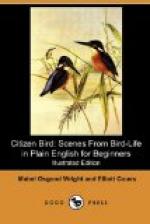After much arranging, talking, and laughing, two wagon-loads of people, rubber boots, fishing tackle, and other things, started toward the shore, a farm hand going with each team to drive the horses back.
“Miss Olive, honey!” called Mammy Bun as they were starting, “don’ you let de chillen eat too many o’ dem clams what has de long necks; dey is powerful full o’ cramps.” And Olive promised that she would be very careful.
When they reached the shore, they found everything ready for them. Olaf’s little home, which contained four tiny rooms, was as clean and compact as a ship’s cabin. There was a kitchen, one room for Olive and Dodo, one for the Doctor, and another for Rap’s mother; while Olaf, Nat, and Rap were to sleep close by in a tent made of poles, canvas, and pine boughs. Several boats were drawn up on the beach, by a creel of nets and some lobster pots, while Olaf’s sharpie was anchored in deep water a little way offshore.
It was late when the horses turned homeward after leaving their loads; it had been a beautiful afternoon, neither too warm nor too cool. “Oh!” exclaimed Dodo, “now that the horses have gone, the good time will begin; for we can’t go back even if we want to.”
The children amused themselves for some time in looking at their new quarters, and then in watching Olaf row out to light the beacon lamps. When it grew dusk they had supper, wondering at the strange stillness of the evening; for, though it was usually very quiet at the Farm, they had never before known the silence that falls with the twilight on a shore where the water does not rush and beat as on the ocean beaches, but simply laps lazily to and fro, like the swinging of a hammock.
Presently the stars began to give good-evening winks at the beacons—first one, then another and another, until the whole sky twinkled; while one evening star, the brightest of them all, hurried along the west as if it were trying to overtake the sun, and knew that it was fully half an hour behind the jolly god of day.
“See how the tide is coming in,” said Rap, when they returned to the beach. “When Olaf went out, he had to push his boat ever so far, and now the water is almost up to the line of seaweeds and shells.”
“I wonder what makes the water go in and out?” questioned Dodo, half to herself.
“I don’t exactly know,” said Rap; “but I think it is because the earth goes round every day, making the water tip from one side to the other and then back again.”
“Then why doesn’t it all tip off into the sky?” persisted Dodo.
“I guess—because—that is, I don’t know,” stammered Rap. “I must ask Uncle Roy to tell us, and why the earth down here on the shore stays sharp and gritty when it is wet; for when the earth up at the Farm is wet, it makes sticky mud,” said Dodo.
“Yes,” said Nat, “and why the stars are of such different sizes, and seem to stay quite still, except some that go along like that big bright one over there.”




